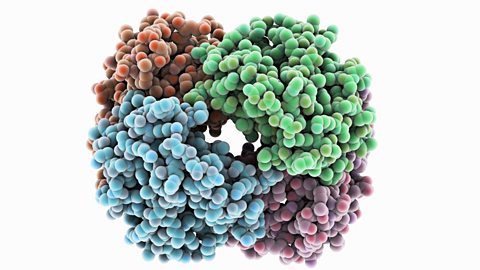Protein synthesis - Higher
Greg Foot explains how the structure of DNA affects the proteins made in DNA synthesis
The DNA code for the proteinOrganic compound made up of amino acid molecules. One of the three main food groups, proteins are needed by the body for cell growth and repair. remains in the nucleusThe nucleus controls what happens inside the cell. Chromosomes are structures found in the nucleus of most cells. The plural of nucleus is nuclei., but a copy, called mRNA, moves from the nucleus to the ribosomeThe site of protein synthesis. where proteins are protein synthesisThe production of proteins from amino acids, which happens in the ribosomes of the cell. in the cytoplasmThe living substance inside a cell (not including the nucleus).. The protein produced depends on the template used, and if this sequence changes a different protein will be made.
Carrier molecules bring specific amino acids to add to the growing protein in the correct order. There are only about 20 different naturally-occurring amino acids.
DNA structure determines the protein synthesised. If this changes a different protein will be made.
A copy of the DNA is made, but is now mRNA.
The copy moves to the ribosome into to the cytoplasm. Amino acids are connected together in a specific order at the ribosome (see diagram) to create a specific protein molecule.
Each protein molecule has hundreds, or even thousands, of amino acids joined together in a unique sequence. It is then folded into the correct unique shape. This is very important, as it allows the protein to do their jobs, such as enzymes or hormones and it can form structures within the body, such as collagen.

Learn more about protein synthesis with Dr Alex Lathbridge.
Listen to the full series on ┤¾¤¾┤½├¢ Sounds.
Learn about how proteins are made during the processes of transcription and translation.